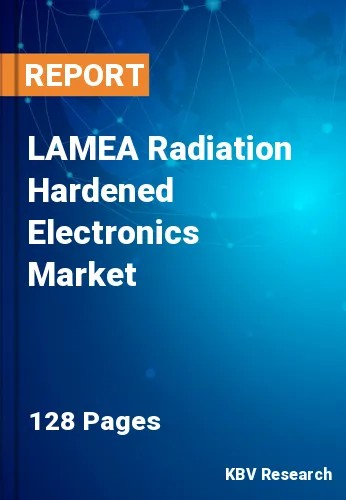The Latin America, Middle East and Africa Radiation Hardened Electronics Market would witness market growth of 7.1% CAGR during the forecast period (2022-2028).
Instead of using traditional semiconductor wafers, hardened chips are frequently made on insulating substrates. Commonly utilized materials include silicon on insulators (SOI) and silicon on sapphire (SOS). Unlike commercial-grade chips, which can take dosages of 50 to 100 grey (5 to 10 krad), space-grade SOI and SOS chips can withstand doses of 1000 to 3000 grey (100 and 300 krad). Many 4000 series chips were accessible in radiation-hardened versions at one time (Rad Hard). While SOI decreases latch up occurrences, the hardness of TID and SEE is not guaranteed to improve.
Compared to CMOS circuits, bipolar integrated circuits have a higher radiation endurance. Many ECL devices can resist 10 000 krad, while the low-power Schottky (LS) 5400 series can withstand 1000 krad. MRAM, or magneto resistive random-access memory, is a promising contender for radiation-hardened, rewritable, non-volatile conductor memory. MRAM is not sensitive to ionization-induced data loss, according to physical principles and early experiments.
The UAE's interest in nuclear energy stems from a desire to produce additional supplies of electricity to fulfill future demand estimates and assure the economy's continued rapid growth. Nonetheless, the UAE government is well aware of the unique circumstances and issues that accompany not only nuclear reactor deployment but also the basic assessment of such a prospect. As a result, the UAE government wants to be clear about its peaceful and unequivocal goals in both its current assessment of a quiet nuclear energy program and the prospective installation of real nuclear power-producing facilities in the future.
Furthermore, the UAE government wants to underline that nuclear energy is just one of numerous choices being considered as the UAE looks to meet future energy needs and build a broad and stable suite of power-generation assets. As a government considering a nuclear power program, the UAE believes that comprehensive operational openness is critical to gaining domestic support and assuring the international community, possible bilateral partners, and international nuclear regulatory authorities of the UAE's peaceful objectives.
The Brazil market dominated the LAMEA Radiation Hardened Electronics Market by Country in 2021, and would continue to be a dominant market till 2028; thereby, achieving a market value of $30.2 million by 2028. The Argentina market is poised to grow at a CAGR of 7.7% during (2022 - 2028). Additionally, The UAE market would display a CAGR of 6.9% during (2022 - 2028).
Based on Component, the market is segmented into Power Management, Mixed Signal ICs, Processors & Controllers, and Memory. Based on Manufacturing Technique, the market is segmented into Radiation-Hardening by Design (RHBD) and Radiation-Hardening by Process (RHBP). Based on Product Type, the market is segmented into Commercial-off-the-Shelf (COTS) and Custom Made. Based on Application, the market is segmented into Space, Aerospace & Defense, Nuclear Power Plant, Medical, and Others. Based on countries, the market is segmented into Brazil, Argentina, UAE, Iran, South Africa, Nigeria, and Rest of LAMEA.
Free Valuable Insights: The Global Radiation Hardened Electronics Market is Predict to reach $1.8 Billion by 2028, at a CAGR of 3.9%
The market research report covers the analysis of key stake holders of the market. Key companies profiled in the report include Renesas Electronics Corporation, STMicroelectronics N.V., Infineon Technologies AG, Texas Instruments, Inc., Microchip Technology, Inc., Teledyne Technologies, Inc., Honeywell International, Inc., BAE Systems PLC, Xilinx, Inc., and TTM Technologies, Inc.
By Component
By Manufacturing Technique
By Product Type
By Application
By Country
Our team of dedicated experts can provide you with attractive expansion opportunities for your business.

